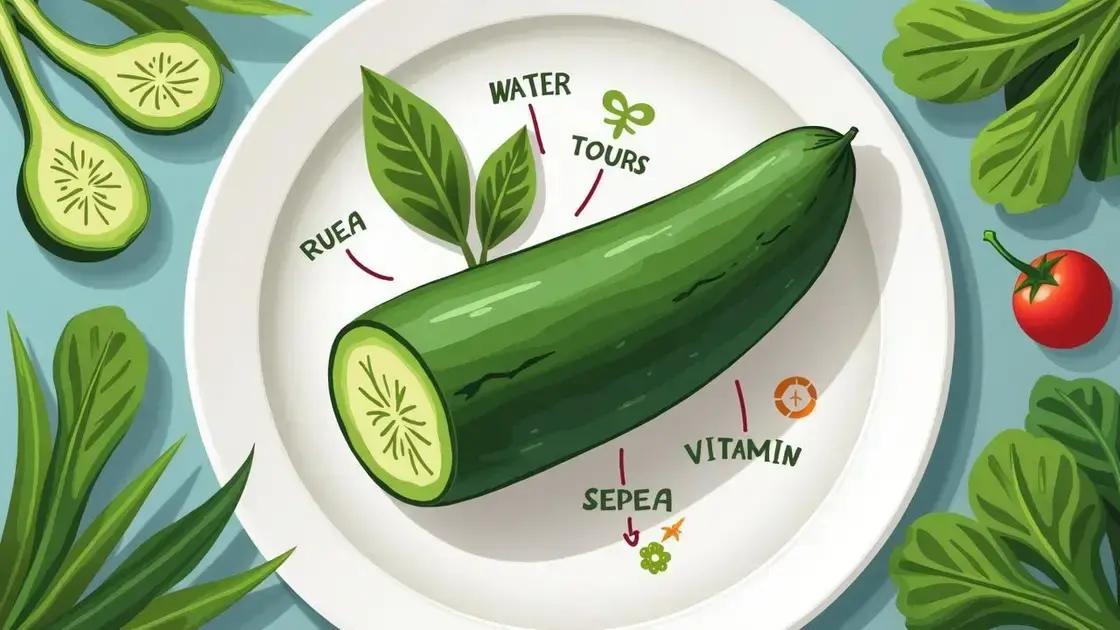African Cucumber, also known as Kiwano, is a nutritious, exotic fruit with no specific age restrictions for consumption. It offers various health benefits, including hydration and antioxidant properties, and can be enjoyed in salads, smoothies, and as a garnish. However, be mindful of local regulations and potential allergies when consuming this unique fruit.
Have you ever wondered, does African Cucumber have age restrictions? This intriguing fruit, known for its unique taste and nutritional benefits, raises interesting questions regarding its consumption. In this article, we will delve into the essential details surrounding this fascinating cucumber, from its health benefits to culinary applications. Additionally, we’ll cover any potential legal implications associated with age restrictions. Join us as we explore everything you need to know about African Cucumber!
Understanding African Cucumber

African Cucumber, also known as Kiwano or horned melon, is a unique fruit native to Africa. It stands out due to its spiky orange skin and vibrant green, jelly-like interior. This exotic fruit not only looks appealing but also has a rich nutritional profile.
Appearance and Growth
African Cucumber typically grows in warm regions, thriving in well-drained soil. It belongs to the cucumber family and can reach up to 10 inches in length. The fruit starts off green and turns bright orange as it ripens.
Nutritional Content
This melon is low in calories and packed with vitamins like Vitamin C, and Vitamin A, as well as antioxidants. It also contains essential minerals, such as magnesium and potassium, making it a healthy choice for snacking or adding to dishes.
Taste Profile
The taste of African Cucumber is often compared to a mix of banana and citrus. Its jelly-like flesh is refreshing and ideal for adding sweetness to salads or smoothies. The seeds are edible and can also provide a crunchy texture.
Popular Uses
Though sometimes consumed fresh, African Cucumber can be used in various culinary applications, such as desserts, salads, and beverages. It can also be blended into juices or smoothies for a tropical twist.
Health Benefits and Risks

African Cucumber offers many health benefits that make it a great addition to your diet. It is low in calories, making it an ideal choice for those looking to maintain a healthy weight. This fruit is rich in vitamins and minerals, particularly Vitamin C, which can boost your immune system, and Vitamin A, which supports good vision and skin health.
Hydration
Due to its high water content, African Cucumber helps keep you hydrated, especially in hot weather. Staying hydrated is important for overall health, supporting functions such as digestion and circulation.
Antioxidant Properties
This fruit contains antioxidants that can help protect your body from damage caused by free radicals. Antioxidants play a vital role in reducing the risk of chronic diseases, such as heart disease and cancer.
Potential Risks
While African Cucumber has many benefits, some people might experience allergic reactions. If you have a known allergy to melons or cucumbers, it’s best to avoid this fruit. Additionally, consuming too much of it may lead to digestive issues, as its high fiber content can cause bloating or discomfort.
Consultation with a Healthcare Professional
Before adding any new food to your diet, especially if you have health concerns, it’s a good idea to consult with a healthcare professional. This is particularly important for individuals with existing conditions or those on medication.
Culinary Uses of African Cucumber

African Cucumber is a versatile fruit that can be used in many culinary applications. Its unique flavor and texture make it an exciting addition to various dishes. Here are some popular ways to use African Cucumber in the kitchen:
Fresh Salads
One of the simplest ways to enjoy African Cucumber is by adding it to fresh salads. Its juicy flesh provides a delightful crunch, and it pairs well with ingredients like tomatoes, avocados, and leafy greens. You can drizzle a light vinaigrette for an even more refreshing dish.
Smoothies and Juices
Blending African Cucumber into smoothies or juices can create a nutritious drink that is perfect for starting your day. Combine it with fruits like bananas and oranges for a sweet and energizing beverage. Its high water content makes it especially hydrating.
sgn cufrs Cucumber Dips and Salsas
Incorporating African Cucumber into dips and salsas is another delicious option. You can create a unique salsa by mixing diced African Cucumber with onions, cilantro, lime juice, and other fruits, such as mango. This can be served with chips or as a topping for grilled meats.
Garnishes and Plating
Due to its striking appearance, African Cucumber makes an excellent garnish for various dishes. Cut it into thin slices or decorative shapes to beautify plates. Use it to add an exotic touch to appetizers during parties or special gatherings.
Legal Implications Around Consumption

When it comes to the consumption of African Cucumber, there are some legal implications that might be important to consider. While this fruit is widely consumed in various parts of the world, its status can vary by region and country.
Regulations and Restrictions
In many countries, there are no specific legal restrictions on the consumption of African Cucumber. However, it is essential to be aware of local regulations about importing and selling exotic fruits. Some areas may have strict rules to prevent the introduction of pests and diseases.
Age Restrictions
Currently, there are no established age restrictions specifically for consuming African Cucumber. This fruit is generally considered safe for people of all ages. Nonetheless, it is advisable for parents to supervise young children while eating new foods to avoid any potential allergies.
Food Safety Standards
When purchasing African Cucumber, it is important to ensure that it meets local food safety standards. Buyers should look for fresh produce that is free from pesticides or harmful chemicals. Always buy from reputable vendors or farmers’ markets.
Consumer Awareness
Consumers should remain informed about the origins of their food and any potential recalls. Be sure to check for any news regarding the safety of tropical fruits, including African Cucumber. Being aware of legal circumstances can contribute to a safe and pleasant eating experience.
In Summary: Understanding African Cucumber
African Cucumber is an exotic fruit that offers a variety of culinary uses and health benefits. Its unique flavor and high water content make it a refreshing addition to dietary routines.
While there are currently no age restrictions on its consumption, it is important for consumers to be aware of food safety standards and local regulations regarding exotic fruits.
From salads to smoothies, African Cucumber can enhance both flavor and nutrition in your meals. As our understanding grows, so too does the opportunity to enjoy this remarkable fruit responsibly.
FAQ – Frequently Asked Questions about African Cucumber
What is African Cucumber?
African Cucumber, also known as Kiwano, is a unique fruit with spiky orange skin and green jelly-like flesh. It is nutritious and refreshing.
What are the health benefits of African Cucumber?
African Cucumber is low in calories and rich in vitamins C and A. It offers hydration and contains antioxidants that can help reduce the risk of chronic diseases.
Can African Cucumber be eaten by children?
Yes, African Cucumber can be enjoyed by children, but it’s advisable for parents to supervise young ones when trying new foods to avoid allergies.
How can I use African Cucumber in cooking?
African Cucumber can be used in salads, smoothies, dips, and as a garnish due to its unique taste and appealing appearance.
Are there any legal restrictions on consuming African Cucumber?
Currently, there are no age restrictions specifically for consuming African Cucumber, but local regulations on exotic fruits may apply.
What should I look for when buying African Cucumber?
When purchasing African Cucumber, ensure that it meets food safety standards and is sourced from reputable vendors to guarantee freshness.













